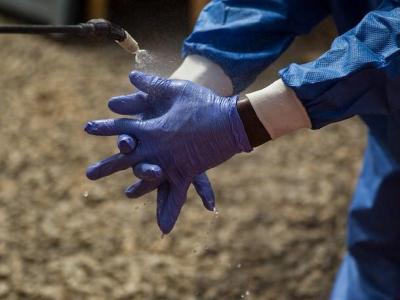Aug 25, 2011
Researchers identify key protein required for Ebola infection
In what may one day prove helpful in combating Ebola infection, which causes one of the deadliest viral hemorrhagic fevers, two research teams have published separate papers in Nature identifying a key protein that the Ebola virus exploits. In the first study, Jan E. Carette of Whitehead Institute for Biomedical Research in Cambridge, Mass., and a team from Whitehead, Harvard Medical School, the Albert Einstein College of Medicine in New York City, and other institutions used a genome-wide haploid genetic screen in human cells to identify host factors required for Ebola virus entry to identify the protein, called Niemann–Pick C1 (NPC1). In the second study, Marceline Cote of Brigham and Women's Hospital in Boston and US researchers from a variety of institutions, including Harvard and Albert Einstein, identified a compound that inhibits Ebola infection by more than 99%. They then used mutant cell lines to show that the target of the inhibitor is NPC1. "We found that if your cells don't make this protein, they cannot be infected by Ebola virus," said Dr. Kartik Chandran of Albert Einstein, who collaborated on both studies. "Obviously it's very early days, but we think our discovery has created a real therapeutic opportunity," he said in a news release.
Aug 24 Carette et al Nature study abstract
Aug 24 Cote et al Nature study abstract
Aug 24 Albert Einstein news release
Aug 24 Harvard Medical School press release
Field trial of bacterial-infected mosquitoes blocks dengue spread
A team of US and Australian researchers have fine-tuned a technique for blocking the spread of dengue viruses by infecting mosquitoes with the Wolbachia bacterial parasite, according to two studies published in Nature yesterday. In their earlier work, the group found that infecting female mosquitoes with the Wolbachia strain wMelPop-CLA halved their lifespan, which killed infected mosquitoes before the parasite became mature enough to infect people. However, they found that the drop in mosquito mortality also limited their ability to pass the Wolbachia bacteria onward. The new process they described in one of the Nature studies involved infecting the mosquitoes with a different Wolbachia strain, wMel. They found that an infected pair of mosquitoes produced fewer eggs and that, when infected, males mated with uninfected females, who produced no eggs. The Wolbachia infection also appeared to suppress other organisms, such as the dengue virus. The goal is to transform mosquito populations to stop the spread of dengue. Dr Michael Turelli, a study coauthor and population biologist at the University of California-Davis (UCD), said in a UCD press release, "It's natural selection on steroids." In the second study, researchers who tested the Wolbachia wMel–infected mosquitoes in two remote Queensland locations found that the frequency of infection in the insects spiked at first and then kept climbing after the releases stopped.
Aug 24 Nature abstract
Aug 24 Nature abstract
Aug 24 UCD press release
HHS awards $137 million to states to boost public health
US Health and Human Services (HHS) Secretary Kathleen Sebelius today awarded up to $137 million to states, partly in Affordable Care Act funds, to strengthen public health infrastructure and provide public health jobs, including for public health labs, immunization programs, emerging disease programs, and resources to combat drug-resistant infections. The awards include $1 million for hiring and preparing scientists for careers in public health laboratories; more than $42 million to support immunization tracking, billing, planning, and implementation; $2.6 million to the Emerging Infections Programs around the country for disease monitoring and professional development; and $1.5 million to prevent ventilator-associated pneumonia to reduce cases of methicillin-resistant Staphylococcus aureus (MRSA) infection and other healthcare-associated infectious diseases. The HHS also awarded eight nonprofits a total of $9.2 million to bolster state, tribal, local, and territorial public health departments. The lion's share of the funding—about $80 million—was directed toward programs to curtail tobacco and other substance abuse. In an HHS release, Sebelius said, "These awards are an important investment and will enable states and communities to help Americans quit smoking, get immunized and prevent disease and illness before they start."
Aug 25 HHS release
FDA bans Mexican papayas over Salmonella outbreak, testing
After finding Salmonella on 15% of Mexican papaya samples, the US Food and Drug Administration (FDA) announced today it was banning imports of the fruit from Mexico. The agency began testing Mexican papayas after the Centers for Disease Control and Prevention (CDC) confirmed that a multistate outbreak involving at least 99 cases of Salmonella Algona infection was traced to papayas from that country. In a news release today, the FDA said, "From May 12, 2011, to August 18, 2011, FDA analysis found a 15.6% Salmonella contamination rate [33 of 211 samples]. The positive samples were from 28 different firms and include nearly all the major papaya producing regions in Mexico. Now, under an FDA Import Alert issued today, papayas from each source in Mexico may be denied admission into the United States unless the importer shows they are not contaminated with Salmonella, such as by using private laboratories to test the papayas. FDA may consider five consecutive commercial shipments over a period of time, analyzed from a validated laboratory, as being adequate for removal from the Import Alert." Mexico produces 11% of the world's papayas, and the United States imports 65% of its papayas from the country, according to a Food Poison Journal report today.
Aug 25 FDA news release
Aug 25 FDA Import Alert
CDC update page on Salmonella Algona outbreak
Aug 25 Food Poison Journal report















